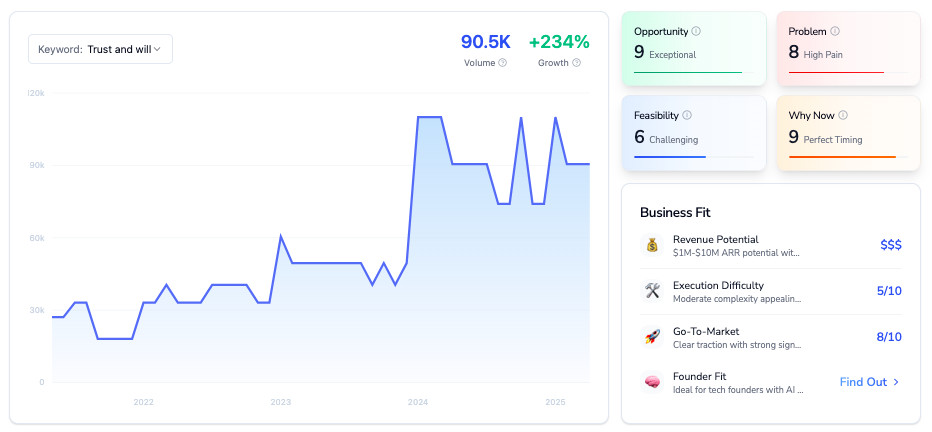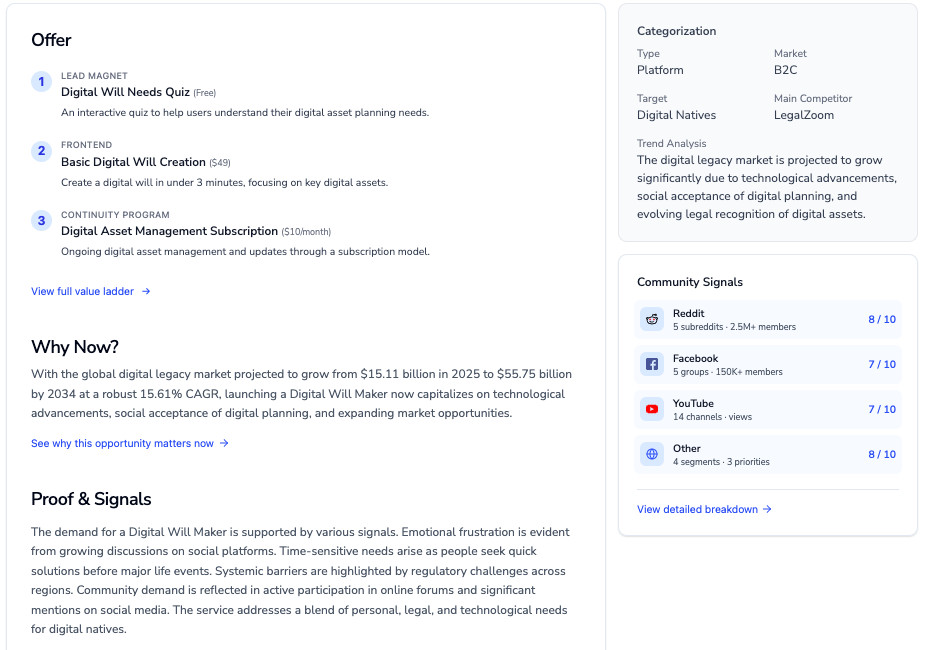From Search Trends to MVPs: The AI That Builds Business Blueprints Daily


In Brief
IdeaBrowser provides daily data-backed business ideas, backed by real-time trend analysis and keyword signals, with market proof, execution steps, and tech stack, enabling solo founders to act without guesswork.

IdeaBrowser delivers one data-backed business idea every 24 hours, built from real-time trend analysis and keyword signals. Each report includes market proof, execution steps, and tech stack—ready for solo founders to act without guesswork.
From Search Trends to MVPs: The AI That Builds Business Blueprints Daily
The IdeaBrowser, launched in beta in June 2025, is an AI-powered business ideation engine that generates fully structured business ideas based on real-time digital activity. Every 24 hours, users receive a fresh business concept built from keyword trends, online discussions, and demand signals across platforms like Reddit, YouTube, Facebook, and Google Search.
IdeaBrowser functions more like an AI market analyst. It reads conversations, identifies patterns, and outputs reports using a 40-step validation system. The result is a data-rich document, containing not just the idea but analysis of opportunity size, feasibility, timing, execution structure, and monetization logic.
A Report, Not a Prompt: How IdeaBrowser Structures Its Analysis
Each report follows a clear, repeatable structure. It opens with an explanation of “Why Now” — a justification based on numbers, not narrative. For example, in one featured idea titled Digital Will Maker, the AI identifies an opportunity in the estate planning sector for crypto-native and tech-savvy users. It cites a CAGR of 15.61%, with the market expected to grow from $15.11 billion in 2025 to $55.75 billion by 2034.
You can also explore other ideas featured by the platform in the “Previous Ideas” section of the dashboard.

From there, the report moves into Proof & Signals — a section that maps online activity to measurable interest. In the same case, the AI highlights the keyword “Trust and Will” with 90.5K monthly searches and +234% YoY growth. It pulls data from 14 YouTube channels, 5 Reddit subreddits, and Facebook communities actively discussing asset inheritance and crypto storage.

Then comes Execution. The AI suggests building a lightweight product using OpenAI’s function calling for legal templates, Supabase for encrypted storage, Stripe for payments, and Coinbase for wallet integrations. Even the go-to-market funnel is built into the plan. It starts with a free interactive quiz to help users understand their needs. Then, users are offered a simple one-time will creation tool for $49. Finally, the service offers a $10/month subscription for continuous digital asset management and updates. This three-step approach helps attract, convert, and retain customers in a predictable way.
Each idea ends with multi-layered scoring based on frameworks like the Value Ladder, Market Matrix, and A.C.P. Model. The Digital Will Maker scores 9/10 for timing, 8/10 for problem severity, and 6/10 for feasibility — all calculated using real data, not assumptions.
Not Just Ideas: The Most Common Patterns from Over 200 Reports
After analyzing over 200 public reports, clear patterns have emerged. Most ideas cluster around lightweight SaaS tools, automation in legal and compliance spaces, low-friction creator monetization, and digital service businesses that solve expensive manual problems.
For instance, in 37% of cases, the AI delivered ideas in sectors with under-served demand and growing search traffic — like personalized nutrition plans, legacy planning for digital assets, and AI-native resume builders. Many of these reflect gaps between user needs and outdated solutions offered by incumbents.
This pattern matters: it means that IdeaBrowser reveals pain points. What it surfaces most often is exactly what users are already trying to solve without success. That gives founders using the platform the ability to enter markets where demand already exists, and execution is the only missing step.
Validation Through Weighted Scoring: How the Engine Decides What Matters
Unlike traditional AI text tools, IdeaBrowser doesn’t generate ideas randomly. It applies structured prioritization. The engine analyzes a mix of input signals: keyword growth rate, presence in online discussions, commercial intent indicators (like pricing mentions or complaints), and solution gap (how many competitors exist and how strong they are).
A keyword showing 100% year-over-year growth signals a clear increase in user interest and search demand. But if it also appears in more than 3 active Reddit threads, shows product dissatisfaction in reviews, and has no dominant paid tools in the space — it’s considered high urgency. This is how the system builds confidence around a concept. It weights timing, demand, and white space, then layers in potential revenue.
This framework eliminates one of the biggest risks early founders face — building based on personal instinct rather than validated opportunity.
The Solo Founder Stack: Why IdeaBrowser Fits the 2025 Builder Profile
The tool has gained momentum particularly among solo founders and indie developers. These users typically lack dedicated research teams, marketing resources, or budget for agency-style market validation.
For them, IdeaBrowser offers an advantage: no time spent figuring out what’s worth building. Just read, build, test. Several users have already shared cases of launching MVPs in less than a week, using existing no-code or AI tools to assemble first versions, and testing traction via TikTok, Reddit AMAs, and Discord launches.
The daily idea delivery becomes more than just an alert — it functions as a product pipeline. Combined with affordable AI tooling, a founder can move from research to prototype in days, not months.
How It Compares to ChatGPT and General AI Tools
While tools like ChatGPT are helpful for brainstorming, they are prompt-driven, not signal-driven. That means users must know what to ask, filter the noise, and validate manually. There’s no awareness of external market context unless explicitly built into the prompt.
IdeaBrowser does the inverse. It starts from what’s happening online — demand, growth, pain — then delivers only ideas that have passed its internal thresholds. It doesn’t need to be asked. It just shows up with answers. Reports are built to take action, not re-interpret.
Each report:
- Tracks where attention is shifting;
- Confirms demand via search and community data;
- Builds execution plans from open-source tools and low-code stacks;
- Scores readiness for launch using real data.
This shift from “ask to receive” → “observe and deliver” is what makes IdeaBrowser part of a new class of vertical AI tools: single-purpose, high-leverage, context-aware systems that do one thing with depth.
What’s Coming Next in 2025: Scaling Beyond Beta
As of June 2025, the platform delivers one report per user, every 24 hours. Beta users receive it by email or dashboard access, complete with scoring, trends, and tech recommendations. Future updates—already visible in UI screenshots—hint at team features, advanced filtering, and geo-based segmentation.
Expected expansions:
- Collaboration dashboards for team accounts;
- Filters by funding potential, geography, or problem size;
- “Claim an idea” system with priority access;
- Custom datasets for users in specific niches (e.g., HR tech, climate tools, legal APIs).
IdeaBrowser is not trying to be a general assistant. It’s positioning itself as a critical component in the solo founder or lean team toolkit. And in a year when time, validation, and accuracy define who survives, that may be what makes the difference.
Greg Isenberg, founder of LateCheckout and CEO behind IdeaBrowser, shared a post on May 29 highlighting four breakout trends surfaced directly through the platform:
This kind of visibility from market operators reflects IdeaBrowser’s shift from just idea generation to directional signal discovery. IdeaBrowser highlights rising trends and clearly points to areas where high-demand products are still missing.
Disclaimer
In line with the Trust Project guidelines, please note that the information provided on this page is not intended to be and should not be interpreted as legal, tax, investment, financial, or any other form of advice. It is important to only invest what you can afford to lose and to seek independent financial advice if you have any doubts. For further information, we suggest referring to the terms and conditions as well as the help and support pages provided by the issuer or advertiser. MetaversePost is committed to accurate, unbiased reporting, but market conditions are subject to change without notice.
About The Author
Victoria is a writer on a variety of technology topics including Web3.0, AI and cryptocurrencies. Her extensive experience allows her to write insightful articles for the wider audience.
More articles

Victoria is a writer on a variety of technology topics including Web3.0, AI and cryptocurrencies. Her extensive experience allows her to write insightful articles for the wider audience.


















































